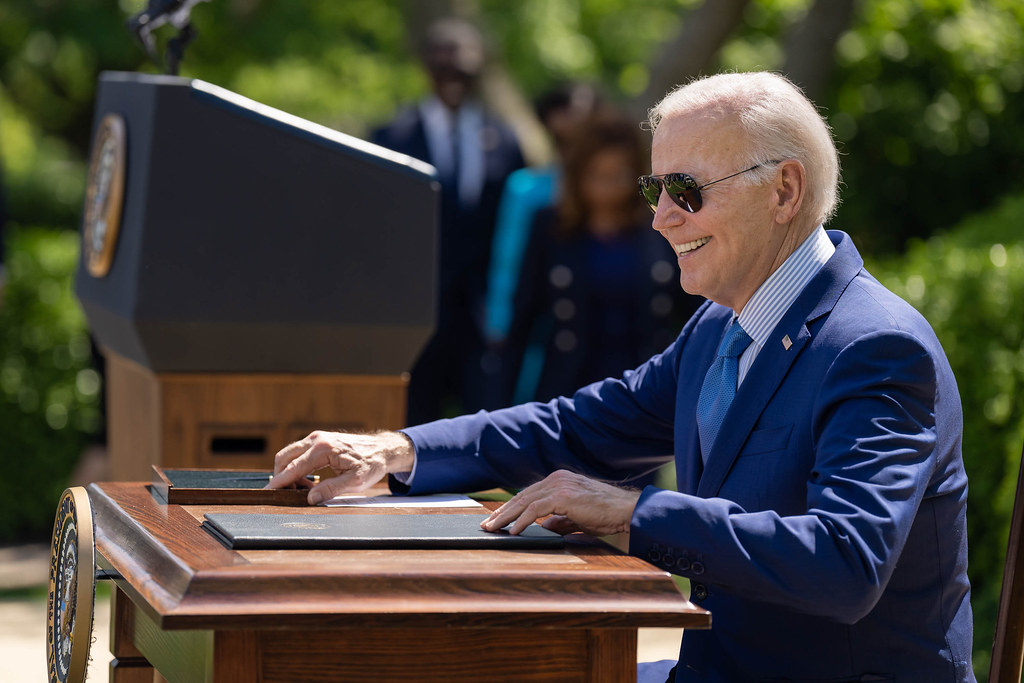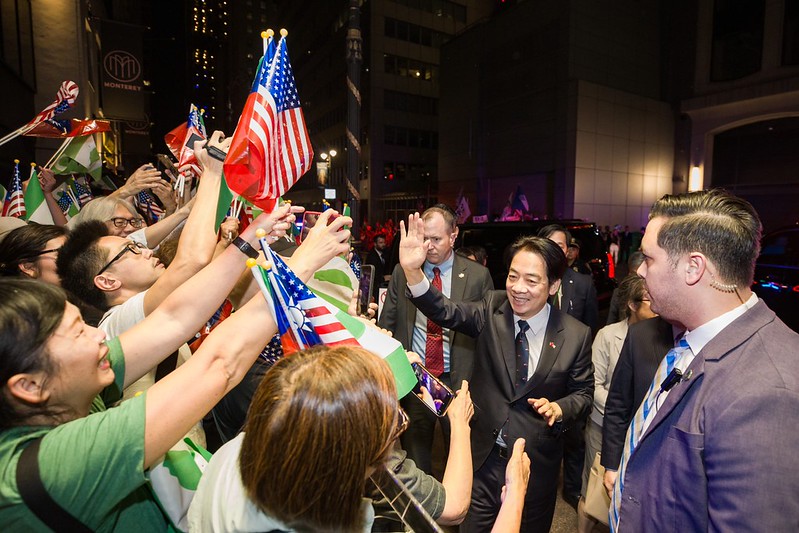
ICAS Bulletin (online ISSN 2836-3418, print ISSN 2836-340X) is published every other week throughout the year at 1919 M St NW, Suite 310, Washington, DC 20036.
The online version of ICAS Bulletin can be found at chinaus-icas.org/bulletins/.

– On August 9, U.S. President Joe Biden signed an executive order on “Addressing United States Investments in Certain National Security Technologies and Products in Countries of Concern.”
– The order, regarded by many as two years in the making, largely aims at restricting investment in China in high-tech industries, especially those of semiconductor chips, quantum computing, artificial intelligence, and other technologies with potential military applications. It has been described as aiming to “protect national security and prevent U.S. capital and expertise from aiding China’s military modernization.”
– Alongside the executive order, the U.S. Department of Treasury released an accompanying 46-page “advanced notice of proposed rule-making,” which firms and stakeholders have 45 days to comment on.
– On August 10, the Chinese Foreign Ministry released a statement that it has “serious concerns” regarding the executive order and “reserves the right to take measures” in response. The Foreign Ministry also demanded Washington “immediately revoke its erroneous decision” and accused the Biden administration of reaching for “technology hegemony.”
– Several observers, both in the private and public sectors, have expressed concerns of the vague, “ambiguous” nature of the order and the accompanying notice of rules by the Department of Treasury.
– U.S. investors in particular have expressed worries regarding China’s potential retaliation or removal from the U.S. market due to the executive order, including but not limited to China restricting its own exports of rare earth minerals vital in high-end technologies.
Associated News References:
“New US tech restrictions on China have investors wary, watching for retaliation,” Fox Business, August 13
“US investors flag retaliation risks after Biden’s China tech curbs,” Reuters, August 11
“New US Rule on China Investments Creates ‘Agony’ of Ambiguity,” Bloomberg, August 10 [Paywall]
“China accuses US of trying to block its development and demands that technology curbs be repealed,” AP, August 10
“Biden issues an executive order restricting US investments in Chinese technology,” AP, August 10

– On August 15, Taipei said it has not seen large-scale military exercises or actions from the PLA, which they had openly prepared for after China condemned Taiwanese Vice President William Lai’s brief stopover in the U.S. on his way to Paraguay.
– Taiwan’s Vice President Lai said during his transit through the U.S. on August 13 that Taiwan will never back down in the face of growing threats from China.
– China condemned Taiwan Vice President William Lai’s transit through the U.S., with Beijing calling him a separatist and “troublemaker through and through” and stating that China will take strong steps to defend its sovereignty.
– While the United Arab Emirates remains an ally of the U.S., its leader’s increasing visits to both Russia and China, new joint military exercises with China, and inflows of Russian oil, money and gold are drawing heavy questions on its alliance status with the U.S.
– On August 7, U.S. President Biden signed legislation to implement the U.S. and Taiwan’s “21st Century” trade initiative, noting that he would pay attention to sections that “raise constitutional concerns.”
– During the first week of August, U.S. and Mongolian officials discussed “creative ways” to export Mongolian rare earths to the world market without depending on goodwill from its only two neighbors: Russia and China.
– A bipartisan group of U.S. senators proposed legislation to establish national security councils in the strategic Pacific island nations important to U.S. military installations to protect them from espionage and coercion from China.
Associated News References:
“Taiwan sees no Chinese military response to VP’s US trip,” Reuters, August 15
“Taiwan will ‘never back down’ to China threats, island’s presidential hopeful says during US transit,” CNN, August 14
“China criticizes visit of ‘troublemaker’ Taiwan VP to US,” Reuters, August 13
“An Oil-Rich Ally Tests Its Relationship With the U.S.,” The New York Times, August 8 [Paywall]
“Biden signs law implementing first part of U.S. trade pact with Taiwan,” Reuters, August 7
“US discussed ‘creative ways’ to help landlocked Mongolia export rare earths, officials say,” Reuters, August 4
“US lawmakers back closer coordination with Pacific islands to counter China,” Reuters, August 4

– Following weeks of investigation, U.S. authorities now suspect that a group of Chinese hackers had breached into not only the email systems of senior Commerce and State department officials but also a member of the Congress House Armed Services Committee.
– On August 11, Beijing announced that a 52-year old worker at a Chinese military industrial group was detained for selling military secrets to the CIA.
– Newly released reports by U.S. military officials revealed that, in 2020, Chinese military hackers were found to have accessed Japan’s classified defense network. The incident gave rise to cybersecurity concerns that have continued to challenge information sharing between the U.S. and Japan.
– In a letter to the Federal Communications Commission, the bipartisan leaders of the House China Committee expressed concerns that U.S. Internet of Things devices could be compromised by using Chinese cellular modules.
– The U.S. State Department voiced “great concern” after China’s Ministry of State Security encouraged Chinese citizens to contribute to counter-espionage works.
– On August 3, two U.S. Navy sailors were arrested and charged with transmitting sensitive military information to China.
– The U.S. House China Committee is considering subpoenaing BlackRock and MSCI executives as they investigate the companies’ investment in China that allegedly help support Chinese military advancement.
– The U.S. expressed concerns about China’s land reclamation projects in Manila Bay, which is located close to the U.S. Embassy in the Philippines.
Associated News References:
“Chinese spies who read State Dept. email also hacked GOP congressman,” The Washington Post, August 14 [Paywall]
“China arrests military industry worker on accusations of spying for the CIA,” CBS News, August 11
“China hacked Japan’s sensitive defense networks, officials say,” The Washington Post, August 8 [Paywall]
“Two US lawmakers raise security concerns about Chinese cellular modules,” Reuters, August 8
“U.S. raises concerns over China’s counter-espionage push,” Reuters, August 3 [Paywall]
“2 US Navy sailors charged with providing sensitive military information to China,” AP, August 4
“Subpoenas possible for BlackRock, MSCI over China investments, US House panel chair says,” Reuters, August 3
“The US is concerned with blacklisted Chinese firm’s hand in island-building near its Manila embassy,” Associated Press, August 2

– On August 13, China’s State Council issued guidelines to help ministries, agencies and local governments optimize China’s investment environment and attract foreign investment.
– Speaking at a political fundraiser on August 10, U.S. President Joe Biden listed China’s growth slowdown, unemployment issues and other domestic challenges as reasons to call China’s economy “a ticking time bomb.”
– According to a recent think tank analysis, China has developed a heavy reliance on the U.S. and its allies for more than 400 items of goods and services. The report argues that such reliance could provide countermeasures to China’s “economic coercion.”
– U.S. imports from China dropped by 25% in the first half of 2023 as Americans turned to other countries for a broad range of goods. Companies including HP, Stanley Black & Decker, and Lego are also reportedly moving their supply chains away from China.
– In exchange for permanent residency through a recently reauthorized immigration program, Chinese investors reportedly showed renewed interest to invest in the U.S.
Associated News References:
“China State Council issues guidelines in bid to increase foreign investment,” Reuters, August 13
“Biden Fears China Economy Is ‘Ticking Time Bomb’,” Bloomberg, August 10 [Paywall]
“China Relies on U.S., Allies for Hundreds of Products,” The Wall Street Journal, August 9 [Paywall]
“As tensions rise, U.S. imports from China plummet,” Politico, August 8
“U.S. companies are buying less China as relations remain tense,” The Washington Post, August 6 [Paywall]
“Chinese Investors Warm to Sweetened U.S. Cash-for-Visa Program,” The Wall Street Journal, August 2 [Paywall]

– Yin Zhiyao, Advanced Micro-Fabrication Equipment Inc. China (AMEC) chairman, commented at the China Semiconductor Equipment Annual Conference that the real goal of Washington’s escalating restrictions is to keep China’s chips “at least five generations behind the global leading edge.”
– Democratic candidate Robert F. Kennedy Jr.’s claim that the U.S. was collecting Russian and Chinese DNA to target people by race was widely criticized as racist and antisemitic in the U.S., but it was a popular idea and found a big audience in China.
– The 44-year-old U.S.-China Science and Technology Agreement (STA) that built a framework for bilateral scientific research will expire at the end of August, and whether the two countries should renew it or leave it to expire has both practical and symbolic meanings.
– The U.S. seeks to find better propellants and lighter warheads to increase the range of its frontline missiles to gain an advantage in the Pacific.
– Nearly 20,000 scientists of Chinese descent who started their careers in the U.S. are leaving the U.S. at an increasing pace, according to statistics from 2010-2021.
Associated News References:
“US wants China’s chip industry 5 generations behind cutting edge, head of equipment maker AMEC says at Wuxi conference,” South China Morning Post, August 11 [Paywall]
“Robert F. Kennedy Jr.’s Unsubstantiated Bioweapon Claims Find Big Audience in China,” The Wall Street Journal, August 10 [Paywall]
“Future of 44-year-old science agreement caught in middle of U.S.-China tensions,” Axios, August 5
“Eyeing China in the Pacific, US studies explosives to make missiles fly farther,” Reuters, August 3
“Scientists of Chinese descent leaving the US at an accelerating pace,” Chemistry World, August 2

“New generation of leaders may be best hope for US-China relations, says ex-Obama adviser,” South China Morning Post, August 15 [Paywall]
“E-commerce giant JD.com denies that founder Richard Liu and wife have moved to the US from China,” South China Morning Post, August 15 [Paywall]
“Electric vehicles: Tesla gives China rivals a taste of price-driven competition,” Financial Times, August 14 [Paywall]
“Korea battery materials maker onshores China supply chain to win US subsidies,” Financial Times, August 13 [Paywall]
“U.S., China agree to double weekly flights between countries,” CNBC, August 11
“China lifts ban on group travel to more than 70 locations, giving a boost to travel stocks,” NBC News, August 10
“Russian and Chinese ships patrolled ‘near Alaska’ but were not ‘a threat,’ US officials say,” ABC News, August 6
“South Korean politician urges US to abandon China chip strategy,” Financial Times, August 5 [Paywall]
“China’s Latest Problem: People Don’t Want to Go There,” The Wall Street Journal, August 3 [Paywall]
August 15 hosted by C-SPAN
August 15 hosted by The Heritage Foundation
August 9 hosted by Foreign Policy
August 9 hosted by Foreign Policy
August 2 hosted by Center for Strategic and International Studies
August 2 hosted by Hudson Institute
August 16 hosted by United States Heartland China Association and University of Missouri-St. Louis
August 25 hosted by International Institute for Strategic Studies
August 30 hosted by Chatham House
August 30 hosted by Brookings
September 18 hosted by Carnegie Endowment for International Peace
August 2023
On August 3, 2023, the Institute for China-America Studies (ICAS) Expert Voices Initiative (EVI) conducted an interview with Mr. Wang Sheng, President of the National Institute for South China Sea Studies (NISCS) to discuss “Blue Carbon Development in China.” The interview was recorded in-person at the NISCS Office in Hainan, China, and hosted by Zhangchen Wang, ICAS Blue Carbon and Climate Change (BCCC) Program Research Assistant.
During the forty minute interview, the host asked Mr. Wang for his views and opinions about the development of blue carbon in China, China’s advantages and challenges in developing blue carbon, the blue carbon ecosystem’s “spillover effects,” and the international cooperation in blue carbon. Wang expounded his views on these widely concerned issues in detail. Wang’s answer helped audiences to gain a deeper understanding of the status quo China’s blue carbon protection and China’s blue carbon policies. Then the host asked Wang about his views on blue carbon international cooperation. As an advocate of blue carbon international cooperation, Wang emphasized that international cooperation can bring common benefits to China and its Southeast Asian neighbors, and believes that China-US blue carbon cooperation is of great significance. He also emphasized that the establishment of international standards for blue carbon protection will boost international cooperation.
August 2, 2023
Columbia University’s School of Social Work, one of the world’s leading research universities, and Committee of 100, a non-profit membership organization of prominent Chinese Americans, have announced the results from a year-long research project and survey that looked specifically at the health, economic, and sociopolitical conditions of today’s Chinese American population.
The first and largest of its kind project to gather wide-ranging data on Chinese Americans, the “State of Chinese Americans” survey gathered information from nearly 6,500 participants compiling data related to demographics, politics, cultural identity, health, economic security, and social engagement. The research effort was supported by over 100 Chinese American and allied organizations nationwide, who shared the survey with community members in English, traditional Chinese, and simplified Chinese.
The Institute for China-America Studies was proud to support this groundbreaking project as a partner organization and look forward to the project’s continued discussions and findings. Getting disaggregated, accurate and comprehensive data on Chinese Americans will help inform policymakers and the public of the diverse set of opinions, perceptions, and needs of Chinese Americans across the country and develop timely and responsive policies, programs, and services to address those needs.
Amanda Jin
August 14, 2023
On August 11, 2023, Center for a New American Security (CNAS) and the Atlantic Council’s Geoeconomics Center jointly held a virtual event titled “The Outbound Investment EO: What’s in, what’s out, and what does it all mean?.” Occurring shortly after the White House released an executive order on August 8, 2023 to restrict U.S. outbound investment to certain Chinese technology, the event intended to “unpack what’s included in the executive order, and what it means for national security and U.S. companies.”
The event started with a discussion about the policy background and intent of the latest executive order (EO). According to Peter Harrell, the EO originated out of concerns that “US investment might be helping Chinese companies getting started or taken to scale in particular high technology sectors in China.” As such, Harrell argued that the EO seeks to primarily focus on U.S. high-tech companies and their operative investment in early- and mid-stage companies in China…

The Institute for China-America Studies is an independent nonprofit, nonpartisan research organization dedicated to strengthening the understanding of U.S.-China relations through expert analysis and practical policy solutions.
1919 M St. NW Suite 310,
Washington, DC 20036
icas@chinaus-icas.org
(202) 968-0595
© 2025 INSTITUTE FOR CHINA-AMERICA STUDIES. ALL RIGHTS RESERVED.